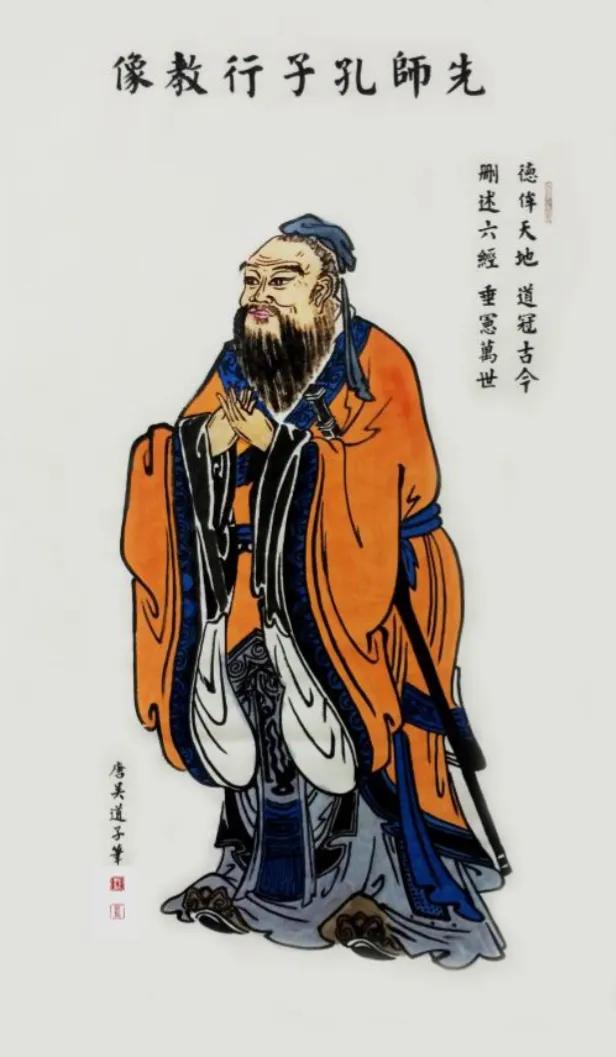"Ritual" is the core value of the Confucian ideological system founded by the ancient Chinese educator and thinker Confucius.

During the Spring and Autumn Period, Confucius inherited and developed the ancient concept of "etiquette" by summarizing, cleaning up and reflecting on the cultural heritage of the Xia, Shang and Three Dynasties, giving it new ideological connotations, and creatively establishing a set of Confucian ideological systems with "etiquette" as the core value concept.
In the Confucian system of thought, "etiquette" not only includes the etiquette or rules for treating people and things in daily life, but also includes the systems and norms in various fields of china's ancient social life, and even includes ideological concepts or moral rationality that are compatible with these systems and norms.
"Ritual" is the core category of Confucianism, which has a wide range of extensions and rich connotations. In terms of its connotation, in Confucian thought, "etiquette" is both a social and political ideal and an ethical and moral norm. It maintains social stability and development through the guidance, restriction and regulation of people's thinking and behavior.
In a sense, it can be said that ancient Chinese culture is the culture of "etiquette", ancient Chinese politics is the politics of "etiquette", and the history of ancient Chinese social development is a history of "etiquette". In ancient China, the degree of development of "ritual" and its role in the whole national spirit and social politics had unique and significant cultural significance.
"Ritual" is the core of traditional Chinese culture
"Ritual" is not only the highest category of the Confucian system, but also the core content of traditional Chinese culture. In the Analects, Confucius repeatedly emphasized the importance of "etiquette" for a person to settle down in society. The Analects of Ji records that Confucius once taught his son Kong Li to say, "If you don't learn etiquette, you can't stand." The Analects of Yao Yue also records that Confucius admonished his disciples: "If you do not know etiquette, you cannot stand up." In Confucius's view, "etiquette" is the foundation of life in the world, and if you do not learn etiquette and do not know etiquette, it is difficult to settle down in the world. This shows the important position of "ritual" in Confucius's ideological system.
In the Confucian system of thought, "ritual" is both a socio-political ideal and a series of ethical principles and norms. Judging from the Six Confucian Classics taught by Confucius, all of them are permeated with a strong content of "ritual" learning. As Pi Xirui, a famous scribe of the Qing Dynasty, said in the "General Theory of Classics and the General Theory of the Three Rites": "The texts of the six classics are all rituals in them. The righteousness of the Six Classics is also particularly important to the liturgy. It should be noted that in Confucius's ideological system, "benevolence" and "etiquette" occupy a very important position.
However, judging from the Book of Rites written by Confucius's disciples or disciples, the status of the two is not consistent. On the one hand, "etiquette" seems to be higher than "benevolence", such as the "Li Ji Qu Li" Cloud: "Moral benevolence and righteousness, incivility can not be achieved." It can be seen from this that "etiquette" is not only the fundamental criterion for regulating all social relations, but even "benevolence" is based on "etiquette."
On the other hand, in the view of pre-Qin Confucians, "ritual" is the norm and criterion of the relationship and order of all things between heaven and earth. For example, the Book of Rites and Music says, "The Liturgy, the Order of Heaven and Earth." This demonstrates the supremacy of "ritual" from a metaphysical perspective. That is to say, in Confucianism, "ritual" has a metaphysical ontological status like the Heavenly Dao.
Cheng Zhu Lixue of the Song Dynasty interpreted "rituals" with "reason", and even raised "rituals" to an important position equivalent to "Tianli". In the system of the science of the second journey (程颢 and 程颐), "reason" is the highest ontology, and "ritual" is connected with "reason". Cheng Haoyue: "Li Yi, Li Ye, Wen Ye." Reason, reality, ben. Writer, Hua Ye, Su Ye. (Henan Ercheng Testament, vol. 11) In Cheng Hao's view, the root of "etiquette" is "reason", and at the same time, "etiquette" is also the text of reason, that is, the embodiment of heavenly reason. Zhu Xi inherited and developed the theoretical thought of the second course, taking reason as the highest philosophical category that unified all things in the world, and constructed a huge philosophical system.